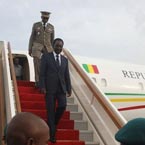
Brussels — More than US$4bn has been pledged to help rebuild Mali, at an international donor conference.
REPORT BY BBC
French President Francois Hollande, co-chair of the Brussels conference, said rich country pledges had exceeded the US$2,5bn anticipated. Mali’s president said the world had “unanimously moved in the direction of Mali”.
The conference is the first since France sent troops to oust Islamist rebels from northern Mali in January.
Mali’s government has a 4,3bn-euro plan for “a total relaunch of the country”.
It includes rebuilding government institutions and the military, repairing damaged infrastructure, organising presidential elections, holding dialogue with rebel groups in the north and stimulating the economy.
“We need water, health, justice, jobs, fairness,” said Mali’s interim President Dioncounda Traore.
Hollande said: “Mali is on the road to recovery.”
- Chamisa under fire over US$120K donation
- Mavhunga puts DeMbare into Chibuku quarterfinals
- Pension funds bet on Cabora Bassa oilfields
- Councils defy govt fire tender directive
Keep Reading
“It is recovering its territorial integrity, is actively preparing for the presidential elections in July and, with the international donor conference in Brussels, is making progress in its development.”
Mali had its unfortunate place in the limelight with the Islamist occupation of the north and the equally dramatic French military action.
Now it is just another broken state among many. And in places the West sees as marginal, donors usually want quick — and preferably cheap — results.
For example, France has pressed Mali to hold national elections before the end of July. But many Malians see this as completely unrealistic in a country where basic institutions, like the army and schools, need rebuilding.
The aid agency Oxfam said donors would have to commit to development funding in Mali for at least 15 years for results to be sustainable. “Crises such as Afghanistan and Somalia,” Oxfam said, “have shown that a narrow approach to winning a military conflict is never enough to achieve long-term peace and security.” The BBC’s International development correspondent, Mark Doyle, says that not all of the pledges may actually be delivered.
He points out that all sorts of techniques will have been used to massage the figures. For example, donor countries often “double count” their aid, pledging it several times under different headings and at different meetings.
The European Union pledged 520m euros (US$673m) to help the country. Traore had described the donation as “a good start”.
European Commission President Jose Manuel Barroso said the money would help the West African state become “stable, democratic and prosperous”. Barroso said the aid would benefit Europe as well as Africa.
“The support of the international community is essential to establish a Mali that is stable, democratic and prosperous,” he added. “But the principal actors in this transition are the Malians themselves and their government.”











